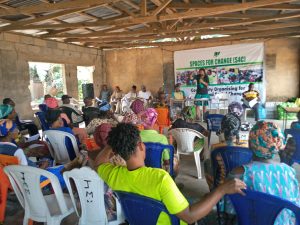A community consultative forum held in commemoration of the 2021 World Human Rights’ Day (Friday 10 December 2021) in Ilile community in Ohaji /Egbema Local Government Area of Imo State has given worried oil-bearing communities a flicker of hope for inclusion, environmental protection and improved benefits from oil and gas projects. The consultative forum organized by SPACES FOR CHANGE | S4C, with support from the Ford Foundation, was attended by over ninety (90) participants – comprising the President General of Ilile Town Union, Traditional Prime Minister, Secretary of the Eze’s Cabinet, women leader, representatives of the traditional ruler, market union executives, youth leaders and other accredited representatives of the community.
Although exploration activities have not commenced in the community, representatives of some oil companies have been visiting the community frequently with different types of strange surveying equipment. Fearing imminent land disposession, disruption of traditional peace and livelihoods, including environmental damage, the consultative forum afforded community leaders an opportunity to gain legal empowerment to engage meaningfully with investors exploring new extractive projects in the community. It was also an avenue to learn from the experiences of neighbouring communities hosting major extractive projects.
S4C’s Legal Officer (Owerri office), Chetachi Louis-Udeh, enlightened them on the existing legal frameworks governing community development and land expropriation for extractive projects. They include the 1999 Constitution as amended, the Land Use Act 1978 (LUA), Petroleum Industry Act 2021, Nigerian Oil & Gas Industry Content Development Act, 2010 (Local Content Act), Oil Pipelines Act etc. Participants also learned about the safeguards prescribed in these frameworks for land owners in event of land acquisition for extractive activities. Communities have the right to receive adequate and timely information on the proposed extractive activity, duration, type of licenses held by operators and environmental hazards associated with the proposed extractive activities. They must also be adequately represented by a legal representative of their own choice to guide them through the negotiation processes to ensure free, informed and prior consent in such transactions in order to bargain for long term benefits instead of temporary gratifications.
Another useful takeaway for participants is the importance of effective community engagements. Instead of engaging communities through their existing leadership structures, oil and gas companies have always preferred to create parallel engagement mechanisms, fuelling deep tensions, violent hostilities and divisions within host communities. This divide and rule tactics employed by the oil companies is a trick communities must avoid and resist. Resisting tension-prone mechanisms can help to balance the lopsided power dynamics between extractive companies and communities, enabling the latter to negotiate better terms that ensure equitable sharing of benefits from natural resources extracted from their communities.
Elated community leaders commended S4C for its robust community outreach programs aimed at deepening local stakeholders’ understanding of the extractive projects. They, however, decried the inadequate information about the nature of the extractive activities scheduled in their locality, the lack of proper consultation with existing traditional authorities and inadequate legal representation for land owners during land negotiation and acquisition processes. Local women expressed fear of their farmlands being compulsorily acquired without adequate compensation.
Community leaders implored S4C to continue to offer them sound legal representation for navigating the complex relationships and contract negotiations with extractive companies. Ms. Udeh assured them of S4C’s commitment to continue providing legal empowerment, technical support and adequate legal representation to host communities during land acquisition and GMOU negotiations.





















